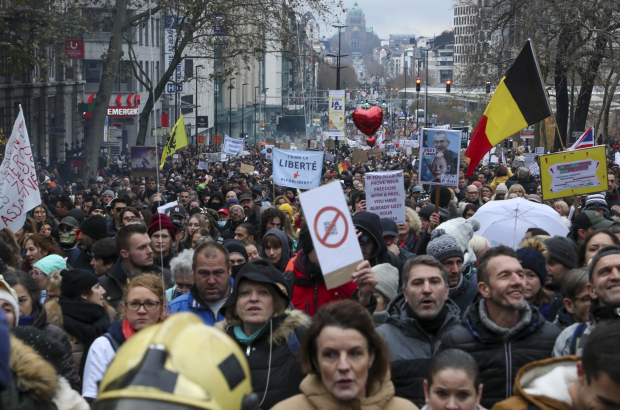- Daily & Weekly newsletters
- Buy & download The Bulletin
- Comment on our articles
Latest demonstration against coronavirus restrictions leads to 20 arrests
Sunday’s demonstration in Brussels against the restrictions brought in to try to stem the continued spread of the coronavirus led to 20 people being arrested and six sustaining injuries as protestors clashed with police.
According to official estimates, about 8,000 demonstrators attended the "March for Freedom Act 2" protest which started at 13.00 at Brussels North station before heading towards the Cinquantenaire park. Due to its organisation taking place at the last minute on Friday, in response to the latest restrictions introduced by the government, attendance on Sunday was far less than the nearly 35,000 participants who took part in the first march on 21 November.
The procession, flanked on both sides by a heavy police presence, marched peacefully in the early afternoon, although some firecrackers and flares were set off. Protesters danced to techno music while others carried placards with slogans such as "Vaccines no thanks", "Covid = organised genocide" and "QR = swastika”. "No vaccine for our children," chanted a group of women among the crowd.
Some carried signs featuring the yellow Star of David used by the Nazis to identify Jews during the second world war, suggesting the growing pressure on the non-vaccinated is similar to the persecution which led to the Holocaust. These signs led to the European Jewish Association reacting with outrage.
"It's hard to say how wrong this is," said Rabbi Menachem Margolin, president of the association. "I find it hard to see the similarity between being asked to get vaccinated during a pandemic, or to face the consequences if you don't, and the systematic extermination of six million Jews in death camps, gas chambers or in open-air mass graves."
"It makes me sick to think that so few people understand the pain that such banners cause, and so few people truly realise the enormity and magnitude of the Holocaust,” he added. “To those who marched today with a big yellow star, I say: don't do that. No matter what you think about health restrictions, no one tattoos your arms, no one sits you in cattle trucks, and no one wants you, your family and loved ones to die. First of all, make sure you have the knowledge and know what this yellow star really represents."
The demonstrators were denouncing the restrictions imposed on the population since the beginning of the Covid-19 pandemic to limit contamination, such as the Covid Safe Ticket made mandatory to access certain places. They also criticised the media coverage of the crisis.
"This is the first time I have demonstrated,” said one attendee. “Something is happening that scares me for our future, our children. I think it's time to make it known. Of course, we must protect the weakest, the elderly but I feel a vaccination obligation is emerging when it is my choice, everyone must be able to have a choice. It's my choice, my freedom, it's my body."
The demonstration began to turn violent as the procession approached the European quarter and the entrance to the Cinquantenaire park when a group within the main section of protestors began throwing road signs or bricks at the police who responded by deploying water cannons. Riot police units with shields and helmets were then deployed. Several roads were blocked with barriers and barbed wire.
The police later announced that they had arrested 20 people. Four participants and two police officers were injured.
During the first march on 21 November, various far-right movements were present. The police have not confirmed that any representatives of these movements were present on Sunday.
Opposition to the health restrictions is likely to increase, according to the Coordinating Body for Threat Analysis (Ocam) which warned that the resistance to the government’s measures is leading to more polarisation, extremism and threats.


















